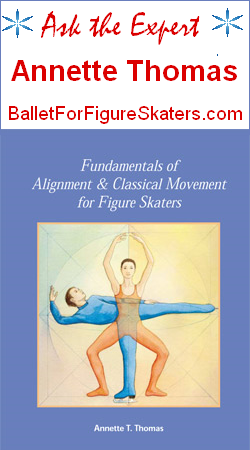Ice Mom: Why should figure skaters take ballet?
Annette Thomas: There is no other single off-ice conditioning class that has as much to offer the figure skater as classical ballet lessons. Classical ballet lessons provide strength & flexibility training, body awareness, balance techniques, mental focus, discipline, musicality and aesthetics all wrapped into one lesson.
Ice Mom: Is it worthwhile for recreational skaters to take ballet?
Annette Thomas: It is always worth taking classical ballet no matter what level of commitment a skater has or what their ultimate goals may be as classical ballet enhances the quality of the experience of movement itself.
Ice Mom: If I have a skater who is a Regional competitor, how many hours of ballet should she take each week?
Annette Thomas: Normally Regional competitors take 2 to 3 ballet lessons per week (meaning technique lesson which are 1/ ½ hours long and not in conjunction with practicing dance recital pieces.)
Ice Mom: If a parent is watching the family budget carefully, would you recommend that she spend her figure skating money on ice and coaching or cut back on those two and include ballet?
Annette Thomas: It depends on the skater and the coach. If a skater has an aversion (or thinks they do!) to ballet obviously this will be a waste of money to try and force a skater into “doing ballet”. Many coaches are skilled at much more than just teaching skating technique and I believe that a lot of skaters miss the complete picture of what their own coach has to offer them aesthetically. Having said that, taking a regular classical ballet lesson can only help to improve the value of all that the skater does on-ice.
Ice Mom: How should figure skating parents choose a ballet instructor, or will any ballet instructor be a good fit for a figure skater?
Annette Thomas: Choosing a ballet instructor is just like choosing a coach. As a parent you should try to observe a class with your skater, discuss the lesson with the instructor afterwards and then privately discuss with your skater what you and she/he felt about the lesson and the teacher. Very importantly there should be a true curriculum based on a syllabus and no practicing of recital pieces during the lesson time.
Please see my web page for further answers to this question:
http://www.balletforfigureskaters.com/book/exerpts/ch5.pdf
Ice Mom: Is there a question I should have asked, but didn't?
Annette Thomas: Yes: “Is all ballet created equal?” Note that I have used the phrase “Classical Ballet” throughout my answers. This is because all ballet is not created equal. Taking lessons at recreational studios which are geared toward recitals more often than not teach ballet as choreography not as a method of technique. Teachers who teach ballet by observation (meaning just as they were taught in class as opposed to having had lessons in pedagogy) will only have a minimum of positive effect. Lyrical ballet will not help the skater at all because there is very little if any refined technique to it and there is no emphasis on strength training. Classical ballet has a true methodology which takes into account the training of the entire body, head, eyes, hands, torso, etc. in incremental portions which ingrain movement and musicality into the muscle memory. It takes into account the importance of the lower back and core muscles as the “fulcrum” of the body which needs to be trained slowly and carefully for maximum potential in both strength and flexibility. Classical ballet technique forms the body from the inside out so that the technique is safe and the dancer/athlete can be secure and confident in their actual abilities.
Questions for Annette Thomas:
Readers are invited to write questions for Annette to answer in the Comments section of this post. Annette has agreed to reply to them there. Some readers have sent in questions in advance. Those questions appear here.
Reader: When a mid-level skater has limited funds, how should it be distributed between on-ice, off-ice, and dance?
Annette Thomas: Distribution is a very individual consideration which you and your primary coach would have the priority in deciding as you discuss your skater's particular needs and what is available in your area. Also the distribution should take into account the temperament and age of the individual skater. On-ice practice is obviously the main priority for a figure skater, but people categorize off-ice in many different ways; most often it boils down to “sports oriented” (strength training, plyometics etc.) and “artistry oriented” (ballet and other dance forms). If you have an excellent classical ballet school in your area and the teacher is willing to work carefully with the skaters’ needs, I think this is the best off-ice training available in one package. If not, you may have to distribute your off-ice time and funds between something such as Pilates and a ballet or modern dance class at a local studio (just opt out of the recitals if at all possible, because that can get very expensive!)
Reader: Why is it that some ballet teachers dislike it when their students start skating? I see that a lot in my rink and often the teachers will ask the skater to stop skating or ballet. They are serious about ballet, but not to the extent of making it a career. What do you tell the ballet teacher?
Annette Thomas: Like most teachers and coaches, ballet instructors want students whose main interest is their “subject.” Children today are often involved in so many activities that long-term focus and commitment are hard to find. Skaters usually take ballet lessons for their own agenda (to improve their skating), which can cause the ballet instructor to feel as though they are not in control of the learning process. Plus, skaters often have a very different sensibility when it comes to timing and movement in general, so it can be difficult for the average ballet instructor to work with skaters in the same class as non-skaters (this is why it is so important to have a ballet program at the rink). And finally, since both ballet and figure skating require tremendous amounts of commitment, energy and hard work, a ballet instructor may feel that they do not want to invest all of the mental and emotional energy required if they know that the student is more devoted to skating. It may sound selfish, but it is just human nature. I know coaches who feel the same way; when one of their skaters’ decides she likes gymnastics and wants to take it more often…it can be frustrating to the coach as they now not only feel like “second fiddle” they also know that their skaters energies and time will be divided making it much harder for them to teach. It is a difficult situation on both sides as the teacher wants to teach in what they feel is the most productive manner possible and yet the student should never be felt to be rejected or “wrong” for choosing other things. I always tell my students “pick one or two things in your life and try to achieve excellence in them.”
As to what to tell your ballet instructor, you might try to interest him/her into working more “one on one” with your skater (via choreography, working at the rink etc.) so that they feel as though they are more a part of the process.
Reader: My daughter is a young skater, just starting out, but has been taking ballet/dance since she was two. What should, if anything, we do differently now that she's skating? Should we be paying more attention to certain parts of dance? Will certain moves help more than others? Also, between ballet and gymnastics, which do you think helps with skating most?
Annette Thomas: If you, your daughter and your primary coach are satisfied with your daughter’s progress, I’d say to just continue with what you are doing. Gymnastics can be extremely hard on the body and I never recommend it (to dancers or skaters). It loosens the lower back and can permanently damage joints. Classical ballet will help your daughter strengthen her body as well help her to progress more quickly in her skating endeavors. If you can find a classical ballet studio that also teaches Character Dance, this would really be ideal to include in her studies.
© 2010 by Annette T. Thomas all rights reserved. Annette T. Thomas's answers are used with permission.
Want to take ballet or movement classes with Annette Thomas? She'll be teaching at the Pettit National Ice Center in Milwaukee this summer. (Artistry & Movement classes are for learning character dance/music appreciation and style.)
Her schedule:
Tuesdays: 9-10 am medium/high ballet JUNE/JULY only, 10:15-11:15 am medium/high movement June/July only, 9-10 am low ballet AUGUST only, 10:15-11:15 am medium/high ballet AUGUST only, 11:30-12:30 medium/high artistry and movement AUGUST only, 3-4 pm medium/high artistry and movement, 4:15-5:15 pm low artistry and movement
Wednesdays: 3-4 pm medium/high ballet, 4:15-5:15 low ballet
Thursdays: 9-10 am low artistry, 10:15-11:15 am medium/high ballet
Do you have a question for Annette Thomas? Take this opportunity to Ask the Expert! You'll find her replies in the comments.
Do you have a question for the Ice Moms? Have you been thinking of a post you'd really like to see? Are you an expert and would like to contribute to the Ask the Expert feature? That's great. I love e-mail, so please contact me at icemom.diane@gmail.com.













21 comments:
My daughter began in ballet when she was 2 and then started figure skating at 5. She is 10 now. This year her ballet teacher felt her technique was strong enough that she should go on pointe. I was concerned about it since it seems like it uses the muscles in the feet so differently than they are used in skating. I asked around but many of the skaters we know just take ballet at the rink, where the pointe issue rarely comes up. Is there any reason she should not be learning to dance on pointe? (I thought she would be complaining of pain by now but she isn't having a problem with it - she is also only on pointe for a short time during her ballet classes.)
I'm pretty surprised gymnastics is considered a problem to skaters!! My 5 y/o is very new to skating but has progressed incredibly fast. She's also in a very advanced gymnastics team (2 hrs x 2 pw). I had assumed gym would complement skating and she'd have at least a year or 2 before being forced to choose between them (and then I thought only time demands would be the cause).
I'd love to hear Annette's comments on what age and stage these secondary activities (or lack thereof) are likely to make a noticeable difference (good or bad).
I'm also surprised about gymnastics being an issue. That was actually my question she responded too! :) I figured that gymnastics would help out with flexibility and balance. Who knew!
For people looking for a dance program, our ballet school {which is run by the state ballet} follows the Royal Academy of Dance syllabus. It's very technique driven. We don't have a recital, we have something called a report of progress that is done during class twice a year. I would recommend that type of program for somebody looking for actual ballet for skating, as opposed to ballet for "fun". Though my daughter still likes it and has fun.
Thanks for your answers Annette. You've given me something to think about. My daughter definitely enjoys skating more then her other activities so far. I would LOVE to not do gymnastics, though we've already signed up for this session anyway.
Annette- I find it nearly impossible to find a studio that teaches ballet for the sake of ballet (and not for a recital). My 9 yo figure skater has it in her head she HATES ballet so to that end I have not gone out of my way (time, money, driving) to really truly seek the right studio out either. She says it is 'boring'- and I had her taking lyrical dance, which now I see it useless for her. Her coaches do extensive off ice training- is that good enough or should I push the ballet issue and find a place for her to take this?
We are fortunate to have a classical ballet teacher whose daughter is a figure skater. She teaches a class called 'ballet for skaters/gymnasts'. She takes figure skating lessons with my daughter's coach and gears her ballet classes towards the individual skater because she knows each of the skaters and their coaches. She is a phenomenal teacher and my daughter loves going her ballet class knowing how much it will help her skating.
For jumpingbeanmom - who said her child found ballet boring that doesn't surprise me. I think most skaters find it boring or hard and therefore, not fun. There are fundamental differences in skaters and dancers. Skaters get on the ice and start freestyling - doing there own thing from beginning to end, unless they have a lesson. Dancers follow the teacher the entire class.
Skaters learn to compete early on, so it is usually more important than show numbers and skating together. Dancers learn to dance together foremost and compete with each other in more subtle ways.
In my day, we were able to get enough skaters for a private "skater" class of ballet. I'm sure the teacher hated having us unruly skaters in a class, but liked having the money. I'm sure the teacher stopped trying to tuck in our butts after a while, because figure skaters do that. It's because we wear blades that extend 3 inches beyond our feet.
I think ballet it really important for skating - so see if you can get the studio to agree to a skaters only class. I also remember it was a nice bonding time for the kids in our club and it was fun for some of the less advanced skaters that ended up being good dancers.
Hello Helicopter Mom!
Skaters taking pointe is a very big issue and comes up frequently. The short answer is if your daughter has taken a "pointe readiness" clinic and has passed with flying colors and the pointe classes are taught very slowly and carefully then I would say it is probably OK for her to continue. I personally would not recommend it for either skaters or recreational dancers as it is an art form which requires a lot of guidance and attention to detail which "occasional dancers" really don't have the time to put into. Most people's bodies do not benefit from taking pointe and the problems and injuries which can occur usually don't show up until later in life.
I have a long post on this subject on my Ballet for Figure Skaters Facebook page if you are interested in further information. Just go to my page and click on the "Can Figure Skaters Take Pointe?" discussion.
Thanks so much for your question and hope this helps!
-Annette
Good Morning Sleepyhead!
(Sorry...I couldn't resist)
I personally love gymnastics and was in it competitively all through high school along with ballet. I now have numerous chronic injury issues which developed from my gymnastic injuries of the long past. The issue is the extreme flexibility training that occurs in gymnastics. It is great for quick improvements in flexibility, extensions etc.. but can be very bad on the joints in the long run. Your daughter is very young and she wont feel these things for quite a while but the fact that skating requires strength especially in the joints and lower back (see how they "dismount" and arch their backs?) ...this is a constant weakening of the lumbar vertebrae which is not a good thing.
Having said this, your gymnastics teachers may be more cautious in the injury prevention department than is typical, and if your daughter loves it and wants to continue I'd say let her stay in it (we can't always live our lives in fear of injury!) Just be aware that there are intrinsic problems with gymnastics and as with taking ballet pointe, these things may not show up until much later in life.
Thanks so much for your question and hope this helps!
-Annette
Sleepyhead also said:
"I'd love to hear Annette's comments on what age and stage these secondary activities (or lack thereof) are likely to make a noticeable difference (good or bad)."
My answer:
I think the secondary activities can show up right away in a young persons skating. The difference between those who are taking a good ballet class and those who are not is very evident. The ones taking classical ballet lessons feel their movements through the music and have better overall body awareness, poise and focus. Those taking most any off-ice supplementary lessons just seem to move more confidently in general.
By age 7-8 any child who is really interested in competing should be considering at least one secondary activity to compliment and improve their skating technique.
-Annette
Hi Kate!
The RAD technique and syllabus are wonderful...so glad your daughter has this great opportunity! And yes, having the Report of Progress is an excellent way to go (instead of the recital which really means nothing technically!)
-Annette
Hi Jumpingbeanmom!
I had to laugh at "she hates ballet and finds it boring"! It really CAN be if it is taught poorly!
Lyrical is only useless when it is a question of taking either classical ballet or lyrical as a sole off-ice training compliment to skating. It is not useless when considering that if a child loves it and they are being exposed to music and movement this is a good thing especially since you say that your daughter is taking other off-ice programs which I am assuming work on her strength and alignment training. If this is the case....keep the lyrical ballet! Forcing her to take something she doesn't want to is a waste of time, money and your relationship with your daughter (definitely not worth it!)
Hope this helps,
Annette
Annette- it definitely does help thanks! I thought (but maybe I am imagining it) I saw some improvement in her gracefulness and movement to music from the lyrical ballet. It could of course also be plain age and experience. And yes, her coaches have an extensive off ice program for strength and alignment and flexibility which she does 3-4 hours a week. The lyrical ballet she is taking is certainly not Bolshoi or anything...but it is close to home, which is more than I can say for the rink- so I figured for one day a week we got a break from the 30 minute one way ride and (hopefully) it benefits her skating in some way!
Hi Anonymous!
Yes...isn't it wonderful to have a ballet teacher who knows skating and works with the skaters and coaches as part of their team!
Thanks so much for sharing this!
-Annette
Hello Ice Charades!
I agree with absolutely everything that you said...actually it almost brought a tear to my eye as many, many years ago (we're talking late 1950's early '60's here!) my mom would bring her ice skating friends to ballet class at Carnegie Hall with her...it would be a majority of ice skaters on that particular day...I remember the laughter and the fun of watching them!
I can't even imagine a skater "enduring" most regular ballet lessons; they really do need to have their own at the rink where everything is geared to their specific needs and is taught with respect to the sport.
Thanks so much for your wonderful and insightful post!
-Annette
When should a skater take classical ballet into consideration? Is it ever too late or too early?
I'm going to throw in a vote for karate as an alternative to ballet, especially a studio that focuses on kata rather than fighting. Karate teaches many of the same things as ballet including body awareness, balance, strength and flexibility, as well as mental toughness, respect for expertise, and goal setting, and is a good choice if you can't find a decent ballet program.
Hello Anonymous!
Classical ballet training should normally begin no earlier than age 7. Many children (especially these days) do not have the attention span required to participate successfully until they are 8 or 9 years old. As far as the other end of the spectrum is concerned, I'd say that a person can benefit from taking classical ballet lessons at almost any age providing they do not have arthritis. I know that I was technically better at age 40 than I was at age 25 so improvement can always be made! I also know of a number of people who became serious about classical ballet only after they entered college and they improved immensely under the right teacher.
Hope this helps,
Annette
Hi Xan!
I agree that the Martial Arts can be a great alternative especially for boys or those who just may have an "aversion" to ballet. I have always wanted to take Tai Chi for the very same reasons you describe. Also something to consider would be modern/contemporary dance (such as Cunningham or Graham technique) if you can find a good teacher as, centering, balance, strength, concentration and inner and outer spaces are explored in depth...all excellent training for the figure skater.
Thanks for posting!
Annette
OK, all you Twin Cities moms out there..any suggestions for dance classses/instructors/studios in the Twin Cities for my 12-year-old skater. She took dance from age 4 thru age 6 but it's the only activity that she absolutely refused to continue with. I think she'd agree to a dance class now to improve her skating (and she needs it!). Haven't been able to find something appropriate for her age that doesn't focus on competitive dance or recitals--don't want to go there.
My daughter has been skating now for about 4 years. She will be nine in June. She's taken ballet classes off and on for a few years and started a class at the rink last fall. Right now she is only doing 1 hour of ballet per week. Is that enough to make any progress or should we try to increase the ballet time? She also does a conditioning class and jazz dance and now that she's working on all her double jumps, her skating time has increased significantly. It's hard to fit everything in!
Hello Anonymous!
As a mom who had 2 girls in figure skating I understand how hard it can be to fit in all those activities! If your daughter is on a competitive track then she really does need to take more than one ballet lesson per week as one lesson will hardly "scratch the surface" of what needs to be done. Normally 2-3 classical ballet lessons are taken per week by the time skaters are serious about competing. Jazz is fun and can really be beneficial from a choreographic standpoint, but classical ballet training provides a much more complete conditioning/training aid for the figure skater. If you are having difficulty fitting it all in, you may want to consider either dropping that class (maybe just have her enroll in Jazz during the summer) or one of the other off-ice conditioning classes. My assumption though, is that the ballet lessons your daughter is currently taking are of the highest quality (please read my comments on "all ballet is not created equal").
You should probably assess with you skater and primary coach what seems to be the most beneficial at this point as well.
Thanks for your question and I hope this helps!
-Annette
Post a Comment